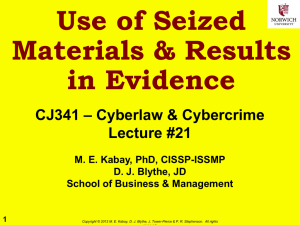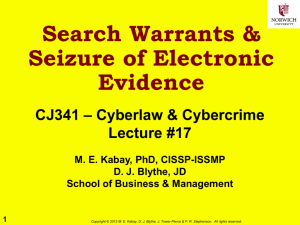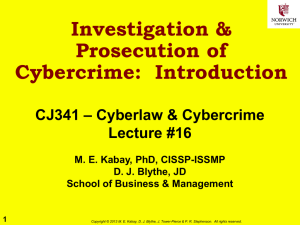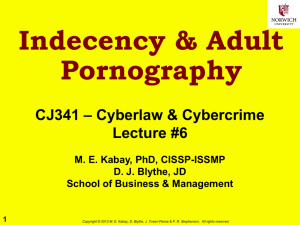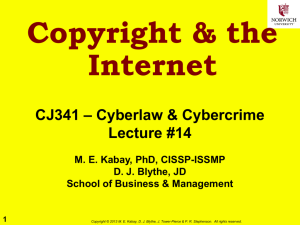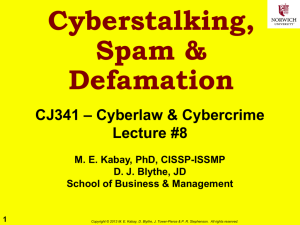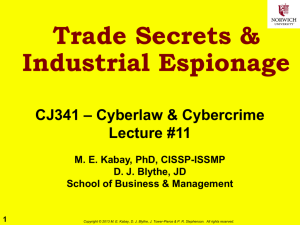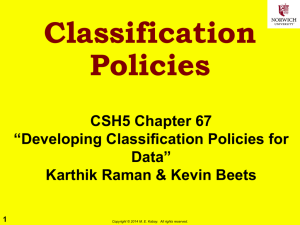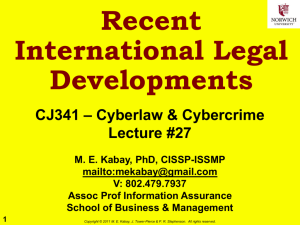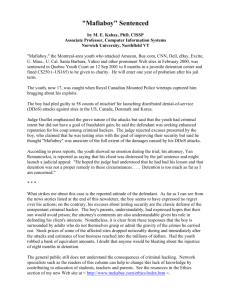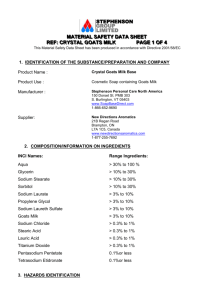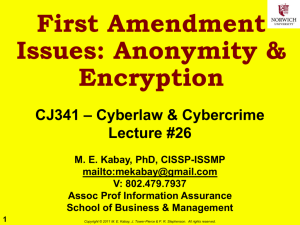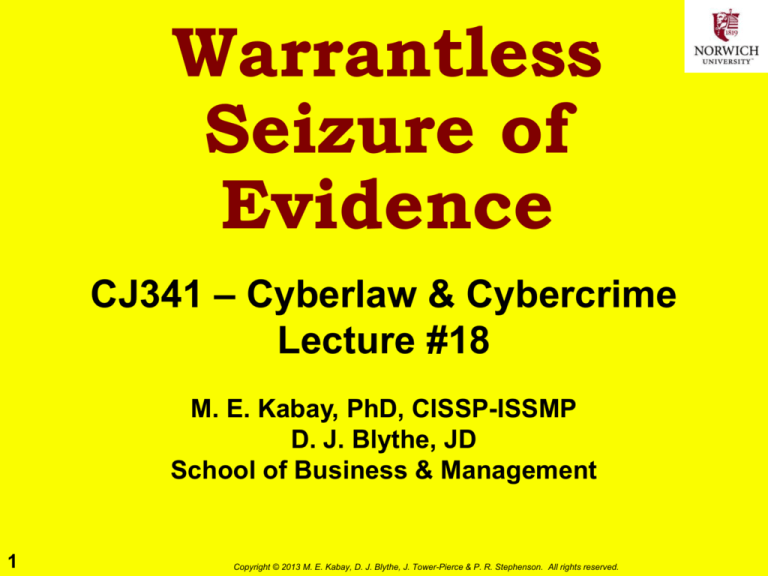
Warrantless
Seizure of
Evidence
CJ341 – Cyberlaw & Cybercrime
Lecture #18
M. E. Kabay, PhD, CISSP-ISSMP
D. J. Blythe, JD
School of Business & Management
1
Copyright © 2013 M. E. Kabay, D. J. Blythe, J. Tower-Pierce & P. R. Stephenson. All rights reserved.
Overview of Topics
Exceptions to Requirement for Warrant
Consent
Search Incident to Arrest
Exigent Circumstances
Inventory
Stop and Frisk
Mobility
Plain View
I.C.E.
2
Copyright © 2013 M. E. Kabay, D. J. Blythe, J. Tower-Pierce & P. R. Stephenson. All rights reserved.
Exceptions to Requirement
for Warrant
Long-standing view in jurisprudence:
Warrant not necessary IF
Owner of property agrees to search
Issues
Does consenter have legitimate right to
consent to search?
Expectation of privacy
Degree of ownership of property
3
Copyright © 2013 M. E. Kabay, D. J. Blythe, J. Tower-Pierce & P. R. Stephenson. All rights reserved.
Consent
Who May Consent?
Employer
Parent
Spouse
Co-User
Third-Party Holder
Notification of Right to Withhold Consent
Limitations and Withdrawal of Consent
4
Copyright © 2013 M. E. Kabay, D. J. Blythe, J. Tower-Pierce & P. R. Stephenson. All rights reserved.
Who May Consent?
Matlock 1974: Common authority
or sufficient relationship to
premises or effects
Rith 1999: Mutual use
Joint access
Control of property for most
purposes
Crucial test: expectation of
privacy
Reduced in shared
accommodations
But evidence of rent & of
security strengthens
expectation of privacy (see
later slides)
5
Copyright © 2013 M. E. Kabay, D. J. Blythe, J. Tower-Pierce & P. R. Stephenson. All rights reserved.
Private Employers
Employer not
acting as agent of
LEO is free to
search own
property without
suppression of
evidence
General acceptance of right of search
For area not exclusively reserved for a
particular employee
Expect same rule for computers
Explicit policy reducing expectation of
privacy strengthens admissibility of evidence
6
Copyright © 2013 M. E. Kabay, D. J. Blythe, J. Tower-Pierce & P. R. Stephenson. All rights reserved.
Public Employers
SCOTUS: O’Connor v. Ortega (1987) established
expectation of privacy for government employees
But open office could
reduce expectation
Also affected by
specific policy
Policy effectiveness
depends on
Clear enunciation of
limits to privacy
(e.g., logon banner)
Evidence that
employees are aware
of policy
Used with permission of artist. http://tinyurl.com/6pszy7
Copyright © 1998 Steve Greenberg. All rights reserved.
Problems
Allowing private use of government computers
Allowing unauthorized encryption
7
Copyright © 2013 M. E. Kabay, D. J. Blythe, J. Tower-Pierce & P. R. Stephenson. All rights reserved.
Parent
8
Closer relationship supports consent
Parents’ consent generally accepted by court
But child must be “essentially dependent”
on parent
Payment of rent reduces authority to grant
consent
US v. Durham (1998): Mother could
not grant consent for search of
son’s computer
Even though she owned some
of equipment
Because son applied security
to system
And he paid small amount of
Pietà, marble sculpture by Michelangelo,
1499; in St. Peter's Basilica, Rome
rent
Copyright © 2013 M. E. Kabay, D. J. Blythe, J. Tower-Pierce & P. R. Stephenson. All rights reserved.
Spouse
Generally viewed as having “joint control and
equal right to occupancy of premises and
access to computers on premises” [Orton p
141]
BUT consent is invalid if
Computer is used exclusively by nonconsenting partner
Kept in separate room (esp. if locked)
9
Copyright © 2013 M. E. Kabay, D. J. Blythe, J. Tower-Pierce & P. R. Stephenson. All rights reserved.
Co-User
Shared use reduces expectation of privacy
But still case law to develop on effects of
Access controls
Encryption
Co-user cannot
grant consent to
prima facie
private areas
of computer
10
Copyright © 2013 M. E. Kabay, D. J. Blythe, J. Tower-Pierce & P. R. Stephenson. All rights reserved.
Third-Party Holder
11
If equipment or media left in possession of someone else,
does that person have right to consent to search without
warrant?
Problematic case law: contradictions
US v. James (2003):
Court ruled search of data CDs invalid because
Owner did not intend to give 3rd party authority to grant
consent for search
But note that CDs were in sealed envelope
US v. Falcon (1985):
Cassette tape labeled “confidential/do
not play”
Court ruled tape admissible without
warrant
Argued holder could have played tape any time
CONCLUSION: best to proceed with warrant to avoid risk of
suppression
Copyright © 2013 M. E. Kabay, D. J. Blythe, J. Tower-Pierce & P. R. Stephenson. All rights reserved.
Notification of Right to
Withhold Consent
Is consent to search voluntary?
Federal system imposes burden of
proof on government using
preponderance of evidence
Other jurisdictions may be more
exigent
E.g., requiring “clear and
convincing evidence”
12
Copyright © 2013 M. E. Kabay, D. J. Blythe, J. Tower-Pierce & P. R. Stephenson. All rights reserved.
Factors affecting judgement
of voluntary consent:
Age/intelligence of suspect
Being advised of
constitutional rights
(Miranda warning)
Custody or detention
(and length)
Physical punishment
or deprivation (sleep,
food)
Generally, advising
person that warrant
will be sought if consent not granted is
acceptable
13
Copyright © 2013 M. E. Kabay, D. J. Blythe, J. Tower-Pierce & P. R. Stephenson. All rights reserved.
Limitations and Withdrawal
of Consent
Consent for search may be withdrawn at any
time
Area of search may be limited
Continuing to search after withdrawal or in
unauthorized areas leads to suppression of
evidence
Does breaking access protection or
encryption violate restrictions on
unwarranted search?
In physical world, breaking locks or sealed
containers has led to suppression
But no damage when breaking security so
evidence may be accepted by court
14
Copyright © 2013 M. E. Kabay, D. J. Blythe, J. Tower-Pierce & P. R. Stephenson. All rights reserved.
Search Incident to Arrest
General principle allows
search and seizure of
evidence at time of arrest
Purpose: prevent
destruction of evidence
Therefore expect same rule for digital
evidence
Particularly useful for seizing cell phones and
PDAs
May contain useful data
E.g., phone lists, calendars, call logs
15
Copyright © 2013 M. E. Kabay, D. J. Blythe, J. Tower-Pierce & P. R. Stephenson. All rights reserved.
Exigent Circumstances (1)
Probable cause
Exigent circumstances
defined essentially by
Imminent destruction of
evidence
BUT
Allows for seizure of
computer
But NOT for search
Need separate
warrant for search
16
Copyright © 2013 M. E. Kabay, D. J. Blythe, J. Tower-Pierce & P. R. Stephenson. All rights reserved.
Exigent Circumstances (2)
US v. Reed (1991) established requirements for
admitting evidence obtained under warrantless
search with claim of exigency
Must demonstrate degree of urgency
Amount of time required for getting warrant
would seriously interfere with process of
ensuring justice
Evidence in danger of
destruction or removal
Danger to officers or
evidence at crime scene
Suspect’s awareness of
anticipated seizure of
evidence
Ease of destruction of
evidence by suspect
17
Copyright © 2013 M. E. Kabay, D. J. Blythe, J. Tower-Pierce & P. R. Stephenson. All rights reserved.
Exigent Circumstances (3)
US v. David (1991)
LEO observed suspect deleting data from PDA
Seized device and scanned names
Court admitted evidence
But exigency ended as soon as PDA was
seized
US v. Ortiz (1996): court ruled that search of pager
was warranted because of risk of data loss as
batteries failed
US v. Romero-Garcia (1997): search of laptop computer was
not warranted by fear of battery failure (would not normally
destroy data)
Best practice: if device seized under exigent circumstances,
obtain a warrant using probable cause to justify search that
will ensure evidence is accepted in court unless data are
evanescent
18
Copyright © 2013 M. E. Kabay, D. J. Blythe, J. Tower-Pierce & P. R. Stephenson. All rights reserved.
Inventory
Normally associated with
searching vehicles to list
all evidence present
Booking search catalogs
possessions of suspect at
time of arrest
Might permit LEO to search computer or
electronic device to determine identity of
suspect
But should not use as basis for extensive
forensic analysis: get a warrant
19
Copyright © 2013 M. E. Kabay, D. J. Blythe, J. Tower-Pierce & P. R. Stephenson. All rights reserved.
Stop and Frisk
LEO may search
suspect for
weapons
May seize
computing device
during search
BUT should not
search computer
without warrant
20
Copyright © 2013 M. E. Kabay, D. J. Blythe, J. Tower-Pierce & P. R. Stephenson. All rights reserved.
Mobility
Vehicle’s mobility serves as exigent
circumstance justifying immediate search
without warrant
Could therefore
reasonably seize a
computer found in
such a search
But Orton argues that
this view could not
justify search of
computing devices
And there is no current case law supporting
such a procedure
21
Copyright © 2013 M. E. Kabay, D. J. Blythe, J. Tower-Pierce & P. R. Stephenson. All rights reserved.
Plain View (1)
Doctrine: If contraband is
Left in plain view of LEO
Who is in lawful place
Then there is no expectation of privacy
Limits
Incriminating nature must be obvious
LEO must be legally allowed to be in
position where item is in view
LEO must not alter search process as
result of plain-view discovery
22
Copyright © 2013 M. E. Kabay, D. J. Blythe, J. Tower-Pierce & P. R. Stephenson. All rights reserved.
Plain View (2)
So cannot exceed limits of warrant when
searching computer even if plain-view item
such as file-name suggests crime
If protocol in warrant specifies searching all
files, may log child porn as long as search
continues through all files
If protocol in warrant specifies searching all
files but only for business fraud data, may
NOT open file suspected to contain child porn
So if new evidence of a different crime is
discovered in plain view, get a warrant to
change search protocol.
23
Copyright © 2013 M. E. Kabay, D. J. Blythe, J. Tower-Pierce & P. R. Stephenson. All rights reserved.
Plain View (3)
US v. Carey (1999)
Narcotics investigation of computer disk
Officer’s discovery of 1st child porn image accepted
in court
But subsequent discoveries suppressed – unlawful
search beyond terms of warrant
US v. Gray (1999)
LEO conducting file-by-file search
Discovered child porn
Immediately applied for warrant to search of child
porn
Court ruled that not only was officer correct but
also that had other child porn been discovered in
systematic examination of all files, those images
would have been admissible also
24
Copyright © 2013 M. E. Kabay, D. J. Blythe, J. Tower-Pierce & P. R. Stephenson. All rights reserved.
Immigration & Customs
Enforcement (ICE)
Homeland Security Act of 2002
http://www.dhs.gov/xabout/laws/law_regulation_rule_0011.shtm
Established Department of Homeland Security (DHS)
http://www.dhs.gov/index.shtm
Combined many US law enforcement and regulatory
agencies
http://www.dhs.gov/xabout/history/editorial_0133.shtm
US Customs Service and Immigration
and Naturalization Service
contributed to
Immigration and Customs
Enforcement (ICE) http://www.ice.gov/
Customs and Border Protection
http://www.cbp.gov/
25
Copyright © 2013 M. E. Kabay, D. J. Blythe, J. Tower-Pierce & P. R. Stephenson. All rights reserved.
Border Searches (1)
Border guards can search & interrogate anyone
entering USA
http://www.dhs.gov/xlibrary/assets/ice_border_search_electronic_devices.pdf
Not subject to 4th Amendment restrictions
Need not ask traveler for consent
May examine any electronic device on demand
May seize and keep devices “reasonable time”
Very few people have their digital info searched or
seized
See Kabay, M. E. (2011). “Search and seizure:
No Fourth-Amendment Rights at Borders.”
< http://www.networkworld.com/newsletters/sec/2011/090511sec1.html >
26
Copyright © 2013 M. E. Kabay, D. J. Blythe, J. Tower-Pierce & P. R. Stephenson. All rights reserved.
Border Searches (2)
Cases cited by Customs & Border Patrol
2004: Canadian traveler carrying software stolen from U.S.
firm convicted of violating EAR trying to sell restricted
software to PRC
2005: traveler showing extreme nervousness carrying child
pornography on laptop computer &CDs
2006: currency smuggler – info on laptop about "cyanide and
nuclear material"
2006: student carrying information on IEDs, a picture of
himself reading his will, and pictures of Al-Qaida terrorists
2007: visitor acting strangely had laptop computer with
"violent jihadist materials" – recruiter for terrorist groups
See Kabay, M. E. (2011). “Justifying spontaneous computer seizures.”
http://www.networkworld.com/newsletters/sec/2011/090511sec2.html
27
Copyright © 2013 M. E. Kabay, D. J. Blythe, J. Tower-Pierce & P. R. Stephenson. All rights reserved.
Now go and
study
28
Copyright © 2013 M. E. Kabay, D. J. Blythe, J. Tower-Pierce & P. R. Stephenson. All rights reserved.

